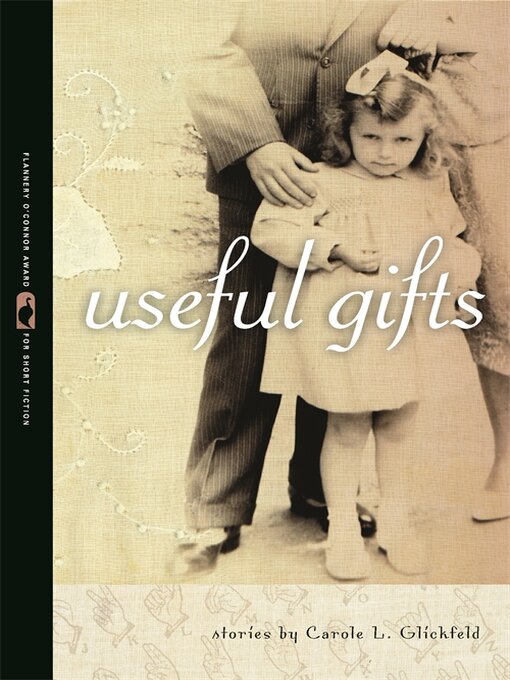Charged with the mystery of childhood, with curiosity and daring, confusion and fear, the eleven interrelated stories in Useful Gifts explore what Ruthie knows. The youngest child of profoundly deaf parents living in Manhattan in the 1940s and 1950s, Ruthie Zimmer speaks and signs. Interpreting for her parents, she tries to make sense of worlds as close as her family's fourth-floor apartment, as expansive as her rooftop playground and as diverse as the neighborhood below.
The ways of language, its ways, its habits, its humor—as well as the demons that rise within us when we fail to communicate—form an undercurrent in many of Carole Glickfeld's stories. In "What My Mother Knows" Hannah Zimmer gleans the neighborhood gossip from her apartment window, telling Ruthie in a gesture that Mrs. Frangione is pregnant again, and announcing in clipped, terse signs that the O'Briens have divorced. "Know drunk?...Unhappy, fight, wife, divorce." There is, in "My Father's Darling" the hoarse, choked screaming of Albert Zimmer, "Honorfatherhonorfatherhonorfather" striking his daughter Melva has she sinks to the floor muttering "Misermisermisermiser" in the distant, disembodied voice of a ventriloquist. And, in "Talking Mama-Losh'n" there is Sidney, Ruthie's older brother, "getting down to business," sprinkling his speech with Yiddish, French and German—words that project a wisdom and cosmopolitanism he clearly craves.
Three floors below the Zimmer apartment, Ruthie enters the altogether different realm of Dot, a thrice-married hatcheck girl, and her daughter and son, Glory and Roy Rogers. These are characters who, as their names seem to promise, bring adventure and excitement—from acted-out fantasies of Hollywood to gunfights amid the rooftop battlements of "Fort Arden," from impulsive, stylish haircuts to Chinese food with pork. And, across the stoop, Ruthie visits with the Opals family—Iris, Ivy, and Ione—three daughters whose endless lessons in charm, elocution and posture prime them for future "fame and glory."
In Useful Gifts, Carole Glickfeld creates, through the optimistic voice of a young girl, intimacy with the complexity and heartbreak of a world we hope she can survive. In the closing story of the collection, Ruth Zimmer, twenty years older, retraces her neighborhood—not only to preserve her memories but to understand, finally, their effect on her now, a grown woman living three thousand miles away.
- Available now
- New eBook additions
- New kids additions
- New teen additions
- Most popular
- Try something different
- New Nonfiction Ebooks
- New Fiction Ebooks
- Stars Cook
- See all ebooks collections
- Available now
- New audiobook additions
- New kids additions
- New teen additions
- Most popular
- Try something different
- See all audiobooks collections
- Home & Garden
- Sports
- Health & Fitness
- Hobbies & Crafts
- Food & Cooking
- Celebrity
- News & Politics
- Travel & Outdoor
- Family & Parenting
- See all magazines collections


